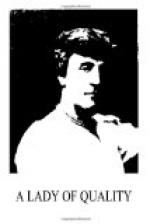At the playhouse when she looked from her box, she saw him leaning against some pillar or stationed in some noticeable spot, his bold blue eyes fixed burningly upon her; at fashionable assemblies he made his way to her side and stood near her, gazing, or dropping words into her ear; at church he placed himself in some pew near by, that she and all the world might behold him; when she left her coach and walked in the Mall he joined her or walked behind. At such times in my lady’s close-fringed eyes there shone a steady gleam; but they were ever eyes that glowed, and there were none who had ever come close enough to her to know her well, and so there were none who read its meaning. Only Anne knew as no other creature could, and looked on with secret terror and dismay. The world but said that he was a man mad with love, and desperate at the knowledge of the powerfulness of his rivals, could not live beyond sight of her.
They did not hear the words that passed between them at times when he stood near her in some crowd, and dropped, as ’twas thought, words of burning prayer and love into her ear. ’Twas said that it was like her to listen with unchanging face, and when she deigned reply, to answer without turning towards him. But such words and replies it had more than once been Anne’s ill-fortune to be near enough to catch, and hearing them she had shuddered.
One night at a grand rout, the Duke of Osmonde but just having left the reigning beauty’s side, she heard the voice she hated close by her, speaking.
“You think you can disdain me to the end,” it said. “Your ladyship is sure so?”
She did not turn or answer, and there followed a low laugh.
“You think a man will lie beneath your feet and be trodden upon without speaking. You are too high and bold.”
She waved her painted fan, and gazed steadily before her at the crowd, now and then bending her head in gracious greeting and smiling at some passer-by.
“If I could tell the story of the rose garden, and of what the sun-dial saw, and what the moon shone on—” he said.
He heard her draw her breath sharply through her teeth, he saw her white bosom lift as if a wild beast leapt within it, and he laughed again.
“His Grace of Osmonde returns,” he said; and then marking, as he never failed to do, bitterly against his will, the grace and majesty of this rival, who was one of the greatest and bravest of England’s gentlemen, and knowing that she marked it too, his rage so mounted that it overcame him.
“Sometimes,” he said, “methinks that I shall kill you!”
“Would you gain your end thereby?” she answered, in a voice as low and deadly.
“I would frustrate his—and yours.”
“Do it, then,” she hissed back, “some day when you think I fear you.”
“’Twould be too easy,” he answered. “You fear it too little. There are bitterer things.”




